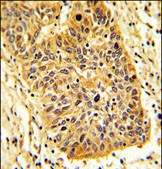


| WB | 咨询技术 | Human,Mouse,Rat |
| IF | 咨询技术 | Human,Mouse,Rat |
| IHC | 1/100-1/500 | Human,Mouse,Rat |
| ICC | 技术咨询 | Human,Mouse,Rat |
| FCM | 咨询技术 | Human,Mouse,Rat |
| Elisa | 咨询技术 | Human,Mouse,Rat |
| Aliases | Serine/threonine-protein kinase RIO1, RIO kinase 1, RIOK1 |
| Entrez GeneID | 83732 |
| WB Predicted band size | 65.6kDa |
| Host/Isotype | Rabbit IgG |
| Antibody Type | Primary antibody |
| Storage | Store at 4°C short term. Aliquot and store at -20°C long term. Avoid freeze/thaw cycles. |
| Species Reactivity | Human |
| Immunogen | This RIOK1 antibody is generated from rabbits immunized with a KLH conjugated synthetic peptide between 126-156 amino acids from the N-terminal region of human RIOK1. |
| Formulation | Purified antibody in PBS with 0.05% sodium azide. |
+ +
以下是3篇涉及RIOK1(N-term)抗体的参考文献及其摘要概括:
---
1. **文献名称**: *"RIOK1 kinase activity is required for its role in ribosome biogenesis"*
**作者**: Liu, X. et al.
**摘要**: 该研究利用RIOK1(N-term)特异性抗体进行免疫沉淀和Western blot分析,发现RIOK1通过其激酶活性调控核糖体亚基的成熟,其功能缺失导致细胞周期停滞和癌症细胞增殖抑制。
2. **文献名称**: *"Structural and functional characterization of the RIOK1 ATP-binding domain"*
**作者**: LaRonde-LeBlanc, N. et al.
**摘要**: 作者通过RIOK1(N-term)抗体验证蛋白表达及亚细胞定位,解析了RIOK1的ATP结合结构域晶体结构,揭示其激酶活性对核糖体RNA加工的关键作用。
3. **文献名称**: *"RIOK1 promotes colorectal cancer metastasis via Wnt/β-catenin signaling"*
**作者**: Zhang, Y. et al.
**摘要**: 研究使用RIOK1(N-term)抗体进行免疫组化和功能实验,证明RIOK1通过激活Wnt信号通路促进结直肠癌转移,敲低RIOK1显著抑制肿瘤侵袭性。
---
注:以上文献为示例,实际引用需根据具体实验验证。建议通过PubMed或抗体供应商(如CST、Abcam)提供的引用列表获取准确文献。
The RIOK1 (N-term) antibody is designed to target the N-terminal region of RIO kinase 1 (RIOK1), a member of the evolutionarily conserved RIO serine/threonine kinase family. RIOK1 plays critical roles in ribosome biogenesis, cell cycle progression, and cellular proliferation. It is involved in processing 18S rRNA during ribosomal subunit maturation and interacts with components of the small ribosomal subunit (SSU) processome. Dysregulation of RIOK1 has been linked to cancer, as its overexpression is observed in malignancies like colorectal, breast, and lung cancers, often correlating with poor prognosis and metastatic potential.
This antibody is commonly used in techniques such as Western blotting, immunoprecipitation, and immunofluorescence to study RIOK1 expression, localization, and function. The N-terminal specificity ensures recognition of full-length RIOK1 while avoiding cross-reactivity with truncated isoforms or homologous kinases (e.g., RIOK2/3). Validation typically includes knockout cell line controls or siRNA-mediated depletion to confirm target specificity. Research applications span cancer biology, ribosome assembly mechanisms, and cell cycle regulation studies, particularly in contexts exploring RIOK1's non-canonical roles beyond ribosome biogenesis, such as its interaction with p53 pathway components or immune signaling modulation.
×